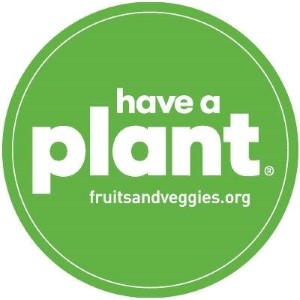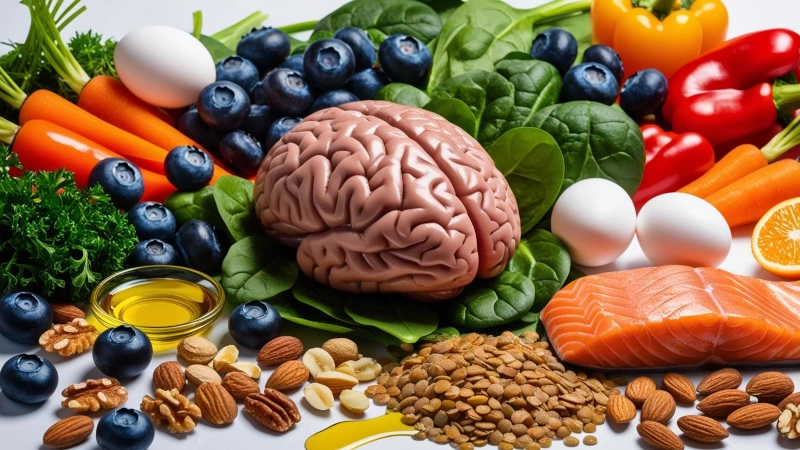Brain health is important to consider at all ages and all stages of life. Every day, we’re learning more about the connections between brain health and the foods we eat. This powerful organ enables us to think, remember, feel, and move, AND empowers every part of the body to do its job. The whole body benefits when we eat food that is good for the brain – here are ten options to explore.

Eggs: Eggs are a nutrient-rich food providing a good or excellent source of eight essential nutrients, including choline, which helps support lifelong brain health including, thinking, mood and more. However, most Americans don’t get enough of this essential nutrient and would benefit from eating more choline to meet the recommended daily intake.[1]
Blueberries: Blueberries are a great food for a healthy brain. They have nutrients that support memory, decision-making, concentration and mood in kids.[2,3,4] Plus, blueberries are high in antioxidants and their deep blue pigment, known as anthocyanins, are associated with a slower age-related decline in cognitive performance.[5]
Leafy Greens: Add leafy greens (think spinach, kale, arugula or swiss chard) to your diet! Consumption of one serving of leafy greens was associated with slower cognitive decline in the Memory and Aging Project.[6]
Other vegetables: Consuming additional vegetables each day can further benefit brain health. Researchers suggest that vitamins K and E, lutein, beta-carotene, folate and nitrate – all found in a variety of vegetables – may play a primary role in slowing cognitive decline with aging.[6]
Nuts: Nuts are a nutritious source of plant-based protein and unsaturated fat – and long-term nut consumption may also improve cognitive function and help reduce cognitive dysfunction, such as dementia.[7]

Olive Oil: Using olive oil as your primary cooking oil is a key component of the MIND Diet, which aims to reduce dementia and brain function decline.[8]
Whole Grains: The MIND Diet also suggests eating at least 3 servings of whole grains per day for optimal brain health. Whole grains, like oatmeal, brown rice and whole wheat pasta, are good sources of fiber and other essential nutrients.[8]
Seafood: Fish and shellfish are among the only foods naturally rich in the omega-3 oils EPA and DHA, which positively affect both brain and heart health.[9]
Legumes: Consumption of legumes, such as beans, peas and chickpeas, has been associated with reduced severity of dementia among older adults.[10]
Wine: Aim for no more than one glass of wine per day. Both red or white may benefit the brain, although most of the research has focused on the red wine compound resveratrol, which may be protective against Alzheimer’s disease.[11]

How to include more brain foods into your diet.
Including brain healthy foods in your diet can help support brain function, improve mood and reduce cognitive decline. So, here’s a plan for how to include more healthy brain foods in your daily eating patterns:
Meal Planning: Planning out your meals for the entire week can help ensure that you’re eating lots of good-for-you foods – but thinking about a whole week of meals can be overwhelming. Give yourself a break and try to plan for just 3 days at a time. What do you have in the that you need to use? What dish can you make for dinner tomorrow that will provide leftovers for lunch the next day
Smart Shopping: Once you have your meal plan, shopping smart is easy! Review what you need for your planned meals, take stock of what you have in the fridge and pantry, and make a list of what you’re missing. Pro tip: organize your grocery list by the sections of the store (produce, dairy, bakery, middle aisles) to keep your time in the store efficient.
Meal Prepping: When you get home from the store, wash and store your fruits and vegetables so that they’re ready to use. Rinse, dry and cut vegetables into sticks to have on hand for snacking. Boil some eggs so they’re ready to snack or chop into salads. Rinse and dry berries and store them in an airtight container with a paper towel.
The post What are recommended foods for brain health? first appeared in The Foundation for Fresh Produce’s Have A Plant® blog.
Written by: The Egg Nutrition Center
The Egg Nutrition Center is the science and nutrition education division of the American Egg Board, consisting of dedicated nutrition health experts with a range of professional experience in food science and nutrition fields.
When it comes to key nutrients for healthy living, eggs rule the roost! Eggs are an all-around nutrient powerhouse that fits into a heart-healthy diet according to the American Heart Association. Plus, they are a complete protein with essential vitamins and minerals – including those crucial for supporting our brains and bodies.
References
1. Wallace, TC, Blusztajn, JK, Caudill, MA, Klatt, KC, Natker E, Zeisel, SH, and KM Zelman. Choline The Underconsumed and Underappreciated Essential Nutrient. Nutrition Today. November/December 2018.
2. Whyte, A.R., Schafer, G., Williams, C.M. Cognitive effects following acute wild blueberry supplementation in 7- to 10-year-old children, European Journal of Nutrition, 2015, 55(6).
3. Whyte, A., Williams, C.M. Effects of a single dose of a flavonoid-rich blueberry drink on memory in 8- to 10-year-old children, Nutrition 2015, 31(3).
4. Khalid, S., Barfoot, K.S., May, G., et al. Effects of acute blueberry flavonoids on mood in children and young adults, Nutrients 2017, 9(2).
5. Kalt, W. et al, Recent Research on the Health Benefits of Blueberries and Their Anthocyanins, Adv Nutr 2019; 00:1-13. https://academic.oup.com/advances/advance-article/doi/10.1093/advances/nmz065/5536953
6. Morris MC, Wang Y, Barnes LL, Bennett DA, Dawson-Hughes B, Booth SL. Nutrients and bioactives in green leafy vegetables and cognitive decline. Neurology. 2018;90(3):e214. doi:1212/WNL.0000000000004815
7. Nishi SK, Sala-Vila A, Julvez J, Sabaté J, Ros E. Impact of Nut Consumption on Cognition across the Lifespan. Nutrients. 2023 Feb 16;15(4):1000. doi: 10.3390/nu15041000. PMID: 36839359; PMCID: PMC9965316.
8. Mayo Clinic. (n.d.). Whole grains: The benefits of whole grains. Mayo Clinic. https://www.mayoclinic.org/healthy-lifestyle/nutrition-and-healthy-eating/in-depth/whole-grains/art-20047826
9. Swanson D, Block R, Mousa SA. Omega-3 fatty acids EPA and DHA: health benefits throughout life. Adv Nutr. 2012 Jan;3(1):1-7. doi: 10.3945/an.111.000893. Epub 2012 Jan 5. PMID: 22332096; PMCID: PMC3262608.
10. Mazza E, Fava A, Ferro Y, Moraca M, Rotundo S, Colica C, Provenzano F, Terracciano R, Greco M, Foti D, Gulletta E, Russo D, Bosco D, Pujia A, Montalcini T. Impact of legumes and plant proteins consumption on cognitive performances in the elderly. J Transl Med. 2017 May 22;15(1):109. doi: 10.1186/s12967-017-1209-5. PMID: 28532453; PMCID: PMC5440936.
11. Ma T, Tan MS, Yu JT, Tan L. Resveratrol as a therapeutic agent for Alzheimer’s disease. Biomed Res Int. 2014;2014:350516. doi: 10.1155/2014/350516. Epub 2014 Nov 26. PMID: 25525597; PMCID: PMC4261550.
About The Foundation For Fresh Produce And Have A Plant® Movement


The Foundation for Fresh Produce’s vision is to grow a healthier world by changing the trajectory of human health. The produce industry has the potential to provide solutions for many of the world’s greatest health and economic challenges – especially those surrounding nutrition and hunger.
The Foundation focuses on improving the appeal of fruit and vegetables as an integral part of people’s diets, supporting the development of infrastructure and supply chain solutions that provide easier access, and establishing strategic alliances that enable children and families to form healthier eating habits.
The transformative Have A Plant® Movement inspires consumers with compelling reasons to believe in the powerful role fruits and vegetables can play to fuel happy, healthy and active lifestyles.



